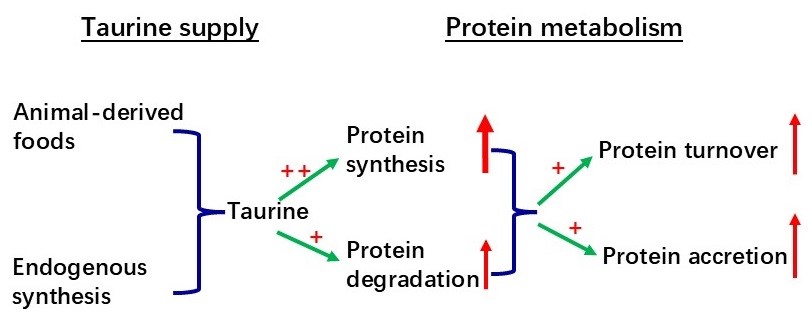Taurine boosts protein renewal and accretion in animals
Published 08 May, 2025
A new study by a team of researchers at the State Key Laboratory of Animal Nutrition and Feeding, China Agricultural University in Beijing, has demonstrated that taurine significantly promotes protein renewal and accretion in animals. Notably, taurine supplementation accelerates protein synthesis while increasing degradation, leading to improved body protein turnover and accretion.
Taurine, a sulfur-containing β-amino acid, constitutes approximately 0.1% of an animal’s body weight and is present in tissues and body fluids in its free form. Unlike other amino acids, taurine is neither incorporated into body proteins nor serves as a precursor for protein synthesis. While animal-derived feeds and seafood are rich in taurine, plant-based feeds contain negligible amounts. Historically, taurine was regarded as a metabolically inert byproduct; however, recent studies have revealed its critical roles in energy metabolism and other physiological processes. Nevertheless, its potential involvement in protein metabolism remains unexplored.
Animals obtain taurine through dietary intake and/or endogenous synthesis, with methionine serving as the primary precursor. Insufficient dietary taurine may divert substantial methionine toward taurine synthesis, thereby limiting its availability for body protein synthesis. Cattle, as strict herbivores, rely exclusively on endogenous taurine synthesis since their diets lack animal-derived ingredients. However, endogenous production meets only 30–40% of their physiological requirements, rendering cattle chronically taurine-deficient. This makes them an ideal model for investigating taurine’s role in mammalian protein metabolism.
Led by Prof. Guangyong Zhao, the research team examined the effects of taurine on protein metabolism in growing beef steers. The study involved supplementing the steers with varying levels of rumen-protected taurine and employing 15N-glycine tracer technique alongside nitrogen balance trial to precisely quantify protein synthesis, degradation, accretion, and turnover.
The findings, published in the KeAi journal Animal Nutrition, demonstrate that adequate taurine intake facilitates protein turnover in animals, promoting the replacement of aged proteins with newly synthesized ones.
“Dietary taurine supplementation may enhance cellular vitality and overall health, potentially contributing to a more health status and youthful appearance in humans,” shares Zhao. “Furthermore, the results indicate that sufficient taurine availability supports healthy growth and development in young individuals.”
The authors note that one issue of particular concern is that strict vegetarians may be at risk of taurine deficiency due to the absence of animal-derived sources in their diet, which could adversely affect their health. Notably, animal products—especially seafood—represent rich dietary sources of taurine. “Regular consumption of seafood may therefore serve as an effective strategy for maintaining optimal taurine levels,” adds Zhao.

See the article:
Shuo Zhang, Jinming Hu, Yufeng Liu, Xu Shen, Cheng Liu, Long Cheng, Mengmeng Li, Guangyong Zhao*. Taurine drives body protein renewal and accretion in beef steers. Animal Nutrition, Volume 19, December 2024, Pages 1-12. https://doi.org/10.1016/j.aninu.2024.07.002